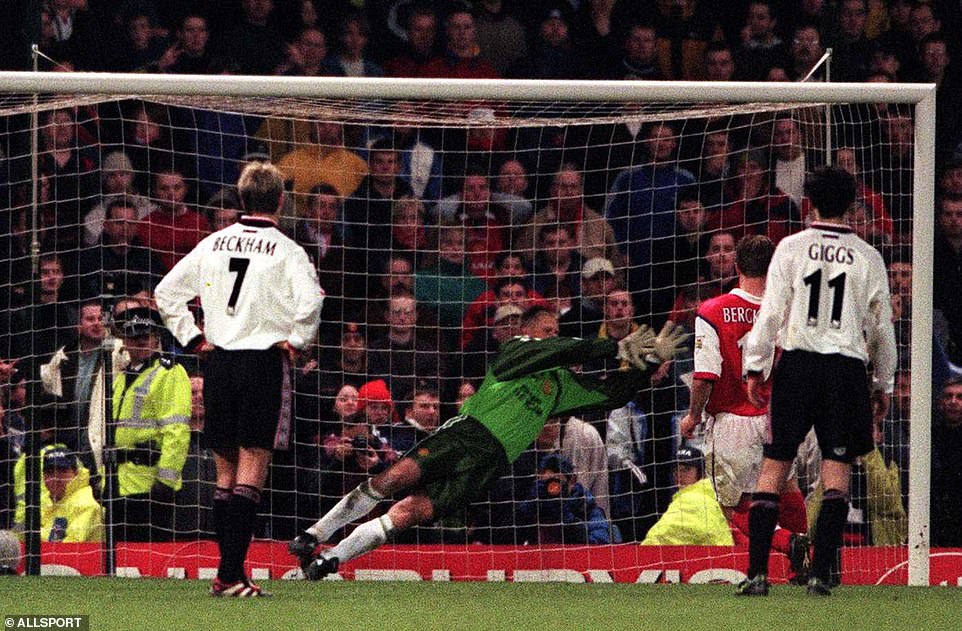
Who is Peter Schmeichel
Peter Schmeichel is a renowned Danish goalkeeper who represented the Denmark national team and clubs such as Manchester United, Sporting CP, Aston Villa, and Manchester City. He is widely regarded as one of the greatest goalkeepers in the history of football. His finest years came at Manchester United between 1991 and 1999, where he was a central figure in winning five Premier League titles, three FA Cups, and the famous treble in 1999. Yet, for all his commanding presence and match-winning saves, the penalty spot remained one area where Schmeichel’s record was surprisingly ordinary.
Schmeichel's surprisingly average record in penalties
For all his brilliance, Peter Schmeichel’s record in saving penalties for Manchester United was surprisingly modest. Across his 292 appearances for the club, he stopped only two penalties in normal time. One was a dramatic last-minute save from Dennis Bergkamp in the 1999 FA Cup semi-final against Arsenal — a moment etched in United folklore. The other came in a Premier League clash against Tottenham Hotspur, when he denied Teddy Sheringham in 1994.
Considering the countless trophies he helped United win, from five Premier League titles to the historic 1999 treble, his penalty-saving record was, by contrast, distinctly average. The table below lists the spot-kicks he faced during his Manchester United career, highlighting both his rare successes and the many that got past him.
| Date | Opponent | Penalty Taker | Result |
|---|---|---|---|
| 29-12-1991 | Leeds United | Mel Sterland | 1-1 |
| 18-01-1992 | Notts County | Tommy Johnson | 1-1 |
| 07-04-1992 | Manchester City | Keith Curle | 1-1 |
| 15-08-1992 | Sheffield United | Brian Deane | 1-2 |
| 10-04-1993 | Sheffield Wednesday | John Sheridan | 2-1 |
| 25-09-1993 | Swindon Town | Paul Bodin | 4-2 |
| 04-12-1993 | Norwich City | Ruel Fox | 2-2 |
| 05-02-1994 | Queens Park Rangers | Clive Wilson | 3-2 |
| 27-03-1994 | Aston Villa | Dean Saunders | 1-3 |
| 27-08-1994 | Tottenham Hotspur | Teddy Sheringham | 1-0 |
| 23-11-1994 | Gothenburg | Pontus Kamark | 1-3 |
| 26-12-1994 | Chelsea | John Spencer | 3-2 |
| 19-08-1995 | Aston Villa | Dwight Yorke | 1-3 |
| 20-09-1995 | York City | Paul Barnes | 0-3 |
| 24-12-1995 | Leeds United | Gary McAllister | 1-3 |
| 20-11-1996 | Juventus | Alessandro Del Piero | 0-1 |
| 23-11-1996 | Middlesbrough | Craig Hignett | 2-2 |
| 08-12-1996 | West Ham United | Florin Raducioiu | 2-2 |
| 06-12-1997 | Liverpool | Robbie Fowler | 3-1 |
| 28-12-1997 | Coventry City | Dion Dublin | 2-3 |
| 06-04-1998 | Blackburn Rovers | Chris Sutton | 3-1 |
| 16-09-1998 | Fc Barcelona | Giovanni, Luis Enrique | 3-3 |
| 14-04-1999 | Arsenal | Dennis Bergkamp | 2-1 |
| 05-05-1999 | Liverpool | Jamie Redknapp | 2-2 |
Absence of Data analysis
In Schmeichel’s era, penalty saving was often a pure mind game — guesswork, psychology, and instinct. But what he lacked was the weapon of modern goalkeepers: data. In the early 1990s, data analysis departments were either nascent or non-existent, leaving keepers to rely on their intuition. Decades later, analytics revolutionized the penalty duel, giving both takers and keepers a detailed map of tendencies and weak spots.
Imagine Schmeichel with today’s data-driven insights — his record might have looked very different. We’ve since seen how analysis changes outcomes: Chelsea famously targeted Edwin van der Sar’s weak side in the 2008 Champions League final shootout; Petr Čech guessed correctly for all six Bayern Munich penalties in the 2012 Champions League final [1], and Real Madrid penalty takers wrong-footed Jan Oblak in the 2017 Champions League final, all thanks to detailed pre-match data preparation[2].
In the end, Schmeichel’s era was ruled by instinct — today’s game is ruled by information.